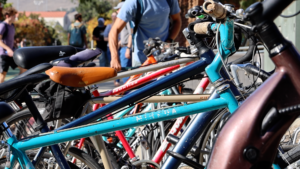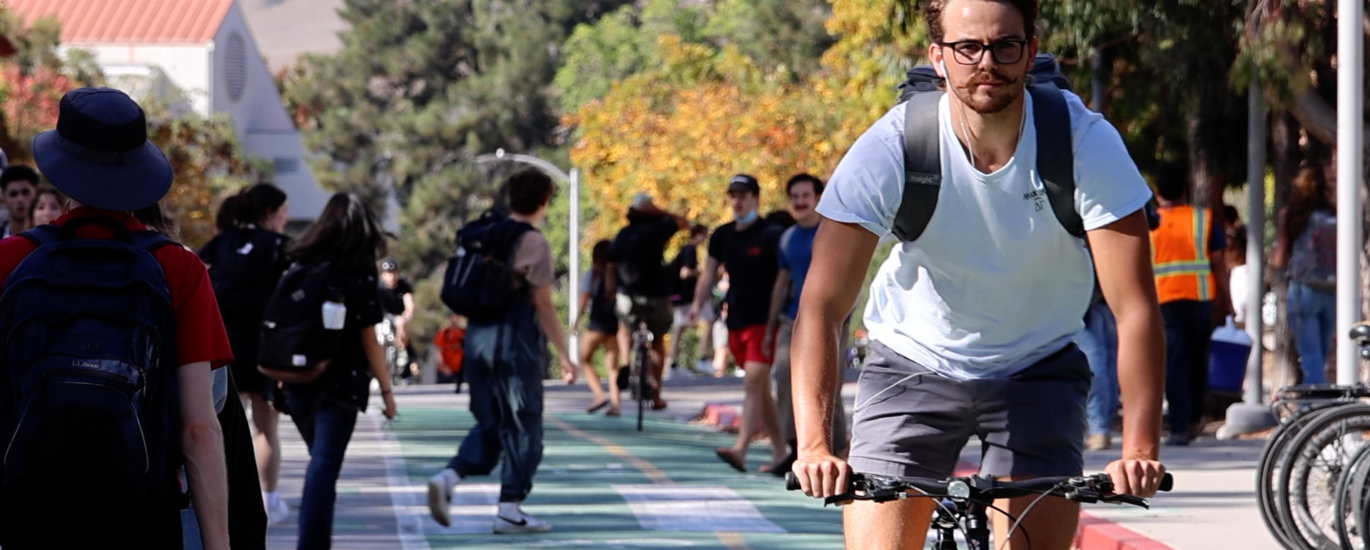By Zoe Boyd
In Alia Lescoulie’s apartment, there are four people who share one car. It’s a choice they made for many reasons.
“I think it’s good that we’re not driving as often, because that produces both carbon and local particulate pollution,” the chemistry senior said. “Bikes take up a lot less space, so you don’t have to dedicate more of campus to parking, and they are a lot less dangerous compared to cars in terms of pedestrian safety.”

Lescoulie’s feelings are representative of a larger cultural shift that is apparent to anyone who has dodged a Onewheel rider on their way to class. More people are choosing to commute car-free, and between 2019 and 2021, e-bike sales more than tripled.
As the reality of climate change becomes more apparent, California has passed a record number of active transportation bills geared toward incentivizing commuters to choose transit and non-motorized forms of transportation. A statewide e-bike incentive program, which is expected to begin early 2023, will offer up to a $750 voucher for an e-bike for qualifying applicants.
Cal Poly, where more than half of carbon emissions come from commuters driving gas-powered cars, is also working to encourage sustainable transportation at the campus level.
Cal Poly’s sustainability efforts in recent years
In 2020, Cal Poly installed two electric vehicle charging stations and 12 dedicated electric vehicle parking spots spread over two parking lots. The charging stations reduced over 30,000 kilograms of carbon dioxide — equivalent to over 3,300 gallons of gasoline — according to a report by the California Energy Commission.
The Cal Poly Green Campus Team, a group of students who work on sustainability projects, is working to get a Platinum rating from the Sustainability Tracking Assessment and Rating System, a group that measures sustainability at college campuses.
Cal Poly Green Campus also has a group of students who are taking steps to improve the conditions for bikers. They hope to help motivate students to take sustainability into account when choosing how they get to and from campus.
“We are currently working to improve biking infrastructure on and off campus as well as develop a sustainable fleet management system,” Golash said. “Additionally, we have other goals of allowing skateboard ridership, reviving the bike auction, granting free RTA passes for the campus community, and getting on-campus shower access to bikers.”
Video by Brady Caskey
Building a bike-friendly community in San Luis Obispo
Both Cal Poly and the city of San Luis Obispo have been recognized for their bike-friendly infrastructure.
In 2017, Cal Poly was awarded bronze-level recognition by the League of American Bicyclists in the Bike Friendly University program.

Cal Poly has dedicated bike lanes which run throughout most of campus, and there are more than 7,000 bike racks throughout campus, many of which are closer to classroom buildings than the car parking lots on campus.
As a city, San Luis Obispo reached gold-level recognition in 2019 from the League of American Cyclists because of its bicycle education, bike to work events, advocacy efforts and bicycle-friendly laws. Additional improvements are underway.
The initiatives that earned Cal Poly and San Luis Obispo those distinctions have inspired some cyclists to change their commuting routines. Others have made the switch for cost-savings and convenience.
“I started riding [an e-bike] to and from campus because it’s much faster than a car to get here, and I don’t have to pay a massive parking fee,” said Chris Lawson, a computer engineering junior. “I timed it, and this takes about seven minutes from my house, versus the car, which varies all over the place with the traffic on our campus roads.”
Featured image by Brady Caskey






